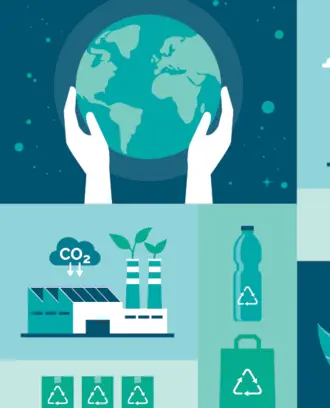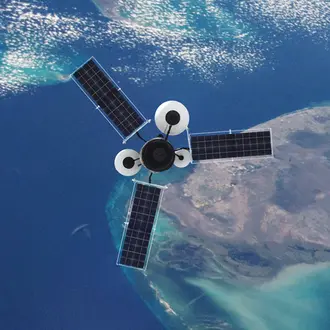In September, the MIT Industrial Liaison Program hosted the 2022 MIT Sustainability Conference to confront the reality of global climate risk in the context of the corporate world.
For two days, members of the Institute community and business affiliates came together to discuss methods and practices for decarbonizing industrial processes and improving resilience.
Jerry Gupta, SF ’08, P&C Research Lead, Swiss Re Institute
One of the panels, “The Challenges and Opportunities of Advancing Sustainable Technologies in Industry,” featured moderator Jason Jay, PhD ’10 (Senior Lecturer, Sustainability; Director, MIT Sloan Sustainability Initiative) and panelists Wei Cai, Chief Technology Officer of Technip Energies; Mike Witt, vice president and Chief Sustainability Officer of Northrop Grumman; and Jerry Gupta, SF ’08, P&C research lead at the Swiss Re Institute.
“Bringing new technologies to market and realizing their transformative potential is not automatic. It takes real work, and there are real challenges and barriers to overcome,” said Jay. “So, what does it take to bring these technologies to market and help them achieve an impact?”
In attempting to answer Jay’s question, the three panelists repeatedly mentioned the need for greater awareness. Specifically, awareness of the reality of climate change, the disastrous local and global effects it is causing, and the immediate need to counter it with new tools.
“For the chemical industry, our customers are more and more inclined to reduce their carbon footprint,” said Cai. However, one of the chief difficulties Technip and similar companies face in this regard is their being downstream from energy.
“We’re influenced by the cost of oil and other similar energy commodities,” she explained. “These costs are very sensitive for our customers, but so too is their awareness of sustainability. It’s a big challenge to their mindset, so any solution we supply needs to provide value first, then be cost-effective. We can always talk about being green and sustainable, but if it’s not working economically then it’s harder to industrialize.”
Recalling the nearly $25 billion in damage Hurricane Michael caused in 2018—including billions of dollars in damage to Tyndall Air Force Base in Florida—Witt said such bellwether events were raising the level of awareness around the need for resiliency.
“We have a 2035 net-zero target, the U.S. government has a net-zero target, and the various departments and agencies also have their targets,” he said. “It’s a big collaboration focused on technology and a commitment to figuring out something that hasn’t been done before.”
Perhaps the panel’s most prudent comments about the necessity of awareness were made by Gupta. “We are in the risk business. It’s about risk identification, risk assessment, and risk management. And at the end of the day, the underlying, foundational thing we need is data.”
However, if Gupta and his colleagues cannot collect the right data in order to perform the calculations necessary to determine the risks their customers face and how best to counter them, then everyone loses—no matter what precisely it is they’re trying to insure.
“There are definitely more challenges than solutions in the market right now, but insurance as an industry is rapidly embarking on a path of analytics, digitization, the Internet of Things, and so forth to make the world more resilient,” he said. “We cannot look at sustainability without taking a systems dynamic view. We must consider the whole integrated society, individual organizations, the earth—all combined.”



